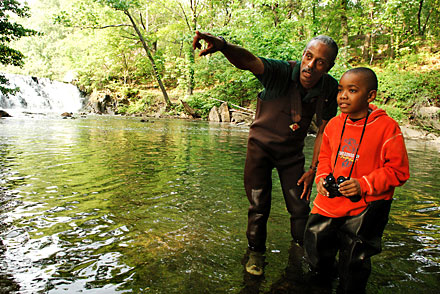Habitat Ecology Learning Program
 The Habitat Ecology Learning Program (HELP) is an exciting interdisciplinary curriculum designed for students in the upper elementary grades. HELP encourages students to use language arts, life sciences, social studies, and math to explore the richness of ecology. This hands-on program consists of six modules: How Nature Works*, Rain Forests*, Grasslands, Wetlands, Deserts, and Temperate Forests.
The Habitat Ecology Learning Program (HELP) is an exciting interdisciplinary curriculum designed for students in the upper elementary grades. HELP encourages students to use language arts, life sciences, social studies, and math to explore the richness of ecology. This hands-on program consists of six modules: How Nature Works*, Rain Forests*, Grasslands, Wetlands, Deserts, and Temperate Forests.
HELP is designed to be extremely flexible. It can be used as a stand-alone year-long curriculum, or incorporated into your existing program as an exciting, motivational supplement. One of the most successful approaches to integrating HELP in your school is to spread the program over grades 4–6, covering different modules each year.
Each HELP module contains roughly 22 detailed lessons and can be taught in sequence with other modules or by itself. The lessons can be incorporated into time blocks allocated to science or other disciplines; at its core HELP is a life-science program that lends itself to interdisciplinary implementation and to team teaching.
HELP addresses the biological, physical and cultural attributes of five important habitats. Although the approach and student activities differ in each module, the following key concepts are covered in all six:
- plant and animal adaptations
- competition
- predation
- climate
- energy flow
- challenges to survival
- human cultures
Exploring the biological and physical components of each habitat leads students to an investigation of human impact on the environment. Through this process of discovery, students learn how topics such as habitat destruction, endangered species, human population growth, and pollution are relevant to their own lives. Emphasis is placed on what students can do to make a difference. For example, after learning about the plight of an endangered species, students are given a hypothetical budget and encouraged to develop a rescue plan and education campaign to help save the animal from extinction.
In each module, students also explore ways humans have traditionally survived the unique challenges of their environments. Understanding how traditional peoples lived in harmony with their natural environment motivates students to investigate the steps they can take to coexist with their own environment.
Contents of the Program
HELP Manuals
Each of the six modules in the program has a complete, detailed, easy-to-use manual with components for both teachers and students. Teachers Manuals are filled with detailed lesson plans which include in-class activities, games, debates, experiments, zoo-visit activities, role-playing simulations, and more. Scope and Sequence charts provide teachers with easy reference and serve as a useful planning tool. Each HELP unit includes a background essay that is particularly useful to teachers who lack a substantial science background. HELP lessons also contain suggestions for challenging gifted students, ways to scale down lessons for less advanced students, homework assignments, project ideas, and art extensions. The manuals are filled with exciting materials for students. These include habitat stories, data sheets, case studies, zoo activity guides, and more. Manipulatives, such as food web illustrations, role-playing cards, and game materials, are also included. All materials are illustrated and easy-to-use.
Audio/Visual Materials
Because teachers express a strong need for visual aids, four of the HELP modules-Temperate Forests, Grasslands, Wetlands, and Deserts-include complete sets of images. The Rain Forest module includes a fascinating hour-long video produced by the Discovery Channel.
*available in Spanish
How to Order
Also available through Acorn Naturalist
Professional Development Opportunities
http://www.bronxzoo.com/educators/educational-materials/habitat-ecology-program.aspx








